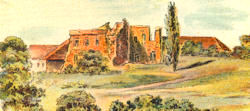Lublin Research History Page
A Unique Collaboration with Trinity Lutheran Church in Lublin
How Things Got StartedIn early 2004 the LDS had scanned the archives of the Lutheran church in Lublin as part of a new effort to institute a new digital platform for dispersal of genealogical records available via the Family History Centers. During the following years this promising development for access to Lublin records seemed to stall among the vast array of issues the LDS faces in trying to digitize their entire microfilm collection. To abide by an agreement made with the Lutheran Consistory Office in Warsaw, the LDS provided on 71 DVDs the complete archive to the Warsaw Consistory and to the church in Lublin.
After two years it became evident that the LDS might not make these records available to the public in the foreseeable future. Plans to digitize their existing microfilm collection proved to be a significant obstacle holding up the release of the Lublin archive. In the mean time this valuable resource continued to sit in the vaults of Salt Lake City . With the help of an advocate who spoke Polish, SGGEE members we able to contact by phone pastor Dariusz Chwastek and Jadwiga Kawiak, archive caretaker of the Lublin church, to inquire if they had been able to use the disks given to them by the LDS. Because this church has few financial resources to upgrade their outdated computer, they could not read DVDs. They suggested we contact the Consistory Office where computer resources were current.
From the consistory in Warsaw we learned that the files on the disks could be opened with any photo-manipulating program and that the disks consisted simply of a large collection of photographic files organized into folders. As we had suspected, the names of each file gave insignificant clues as to what was contained in each photographic scan. Realizing that no special software was needed to view the files we then discussed the situation with the pastor. The church could not use the disks since their computer was too out-dated, but even if they had a capable computer they would not know where to find specific records because the file names were represented by a nebulous code produced by the scanning software. This posed our next obstacle since the church could not use these disks thereby benefiting no one.
Partnering with the Trinity Evangelical Church of Lublin
Fortunately, Pastor Chwastek was very open to working with SGGEE to make this archive readily searchable in such a manner that the church could know where to find any record of interest. Pastor Chwastek had envisioned having an online search tool where anyone could search an index for names and request specific records from the church. SGGEE then proposed to assemble a team of volunteers to index these records with the understanding that we would not duplicate these disks such that once the project was completed, the church and Consistory Office in Warsaw would retain the only complete copies of this digital archive (with the exception of the LDS). The SGGEE board of directors unanimously approved the transfer of sufficient funds to Lublin Trinity Evangelical Church for them to purchase a suitably equipped computer, printer, scanner, and a few other accessories. In Lublin the church board considered this offer of collaboration and eagerly agreed to our conditions commenting that it was generous of SGGEE to offer this help and provide financial support to upgrade their computer. Certainly, this equipment would also be used for standard church office activities, but this upgrade would enable them to work with the digital archive.
There was great excitement once the church purchased and set up the computer since they finally had equipment that was current and could effectively access the internet. The pastor spent several weeks copying each disk to their secondary hard drive and studying what was contained in this collection. He also proceeded to make a second copy of all disks which would be sent to us for the indexing project. This familiarity allowed him to make a list describing what types of records were contained on each disk (see the Disk Descriptions file) so we could choose disks we wanted to work on first. The files on the DVDs have no particular organization to them other than one disk corresponds to one parish book or a particular collection of folders containing detached records or documentation.
Due to the vast numbers of records found on each disk (usually about 1,000 to 3,000 records per disk) it will take several years for the volunteers to complete this indexing project. Undoubtedly many treasures sit among these records as the volunteers are quickly finding out. The Team Lublin volunteers all have ancestors and other relatives who lived near Lublin and many new discoveries are coming forward pertinent to their own families. This project is thus expected to benefit anyone with Lutheran ties to Lubelskie. Furthermore, since this area was a transit point for many Germans who moved on to Volhynia, many of the families can be found among these records during their temporary stay in this region.
Another unexpected asset we are quickly finding is that fairly detailed information of genealogical interest is found for the deportation years during and just after World War I. Apparently the reporting of births and deaths that occurred in Soviet territory was made by the surviving Germans who returned. This served to document the many deaths that occurred during those stressful years. If one searches for the term “Russland” in the location field, these deportation-related records will be revealed.
It is not known which other churches in Poland the LDS has visited to digitize their archives. It is expected that this project will serve as a prototype example of what can be accomplished if the church is willing to work with others to avail their archives to the world-wide community.
Acknowledgements
SGGEE is grateful to pastor Dr. Dariusz Chwastek and Mrs. Jadwiga Kawiak for their cooperation in establishing this provocative project. The volunteers contributing to the indexing of the records are indicated in the table below.
If you would like to join this project please contact Karl Krueger (dabookk54@yahoo.com). A computer that can read DVDs and some familiarity with spreadsheets (Excel is most beneficial) are necessary. Familiarity with German, Polish, or Russian (our greatest need) in particular are helpful.
| NAME | COUNTRY |
| Ted Belke | Canada |
| Bianca Bergmann | Germany |
| Stefan Düsterhöft | Germany |
| Sandor Krause | Germany |
| Karl Krueger | United States |
| Susie Tonn Lewis | Canada |
| Barb Nakahara | Canada |
| Sigrid Pohl Perry | United States |
| Bianca Ute Ritz | Germany |
| Kyle Sattler | Canada |
| Regina Steffensen | Germany |
| Harald Steinebel | Germany |
| Ilona Timm | Germany |
| Brigitte Vahlenkamp | Germany |
| Carsten Wöhrmann | Germany |


